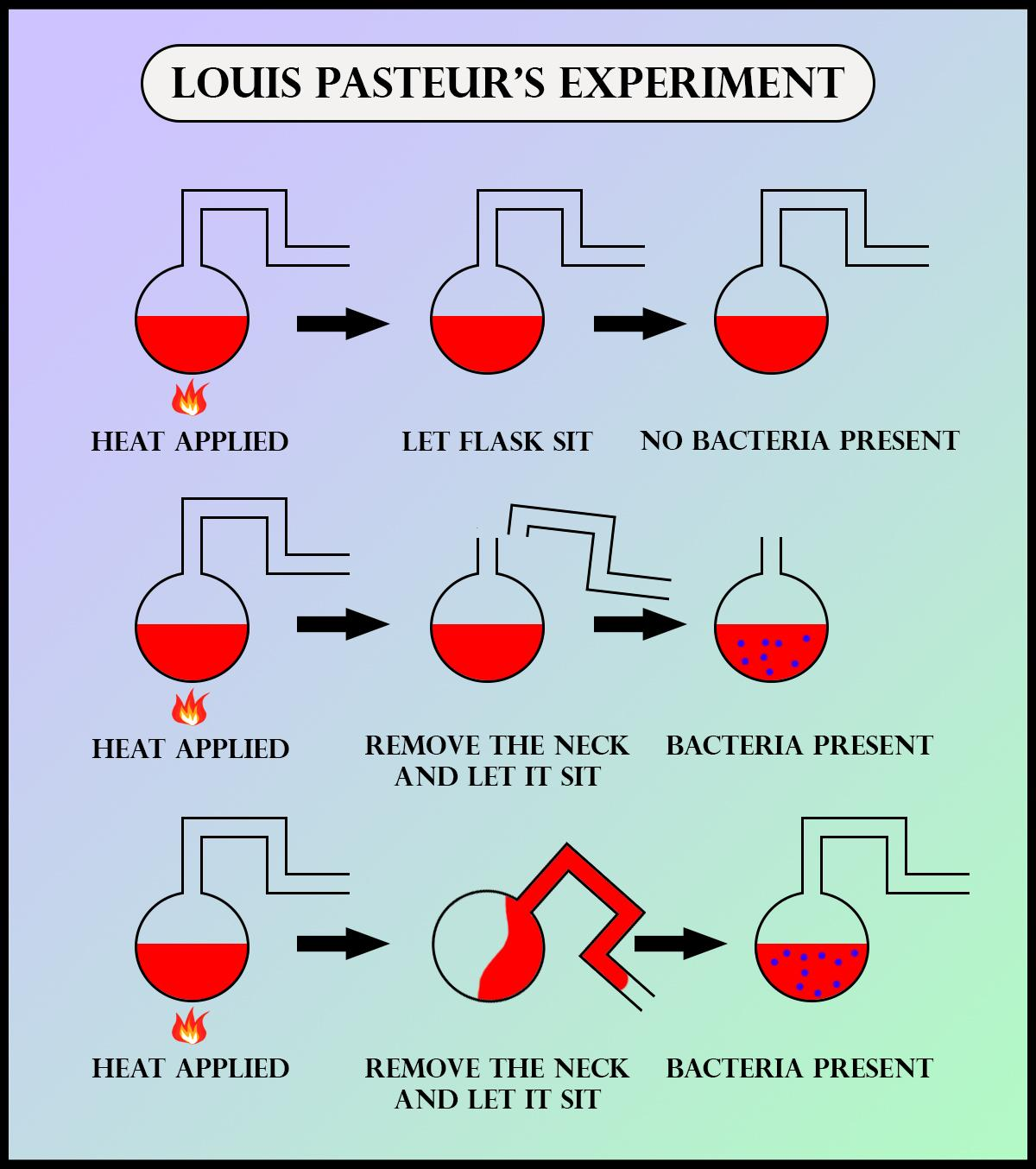
What did Louis Pasteur's experiment on killed yeast demonstrate? Name the theory that got disproved on the basis of his experiment.
Answer
567.3k+ views
Hint: This theory held that living creatures could arise from nonliving matter and that such processes were commonplace and regular. In earlier times it was hypothesized that certain forms such as the fleas could arise from inanimate matter such as dust, or that maggots could arise from dead flesh.
Complete answer:
The Louis Paster experiment on killed yeast demonstrated that present life forms are evolved from pre-existing living things only. Prior to this experiment, it was a belief that life has evolved spontaneously from some non-living matter too and this theory was popularly known as the theory of spontaneous generation.
Louis Pasteur disproved the theory of spontaneous generation by this experiment and earned him the prestigious Alhumbert Prize from the Paris Academy of Sciences in 1862. In the following lecture held in 1864 Pasteur said “Omne vivum ex vivo” which means “Life only comes from life”. The theory of spontaneous generation was hence disproved.
Additional information:
During the experiment, Pasteur made a series of flasks with long, twisted necks (“swan-neck” flasks), in which he boiled broth to sterilize it. The unique design of the container allowed air inside that to be exchanged with air from the outside but prevented the introduction of any airborne microorganisms, which would get caught in the bends of the necks of the container or flask. If a life force apart from any airborne micro-organisms would enter the flask and be responsible for the microbial growth within the sterilized flasks, it would have access to the broth, or the micro-organisms would not survive. His prediction was correct that sterilized broth in his swan-neck flasks would remain sterile as long as the swan necks remained intact. However, if the necks would be broken, microorganisms would be introduced, contaminating the flasks and allowing microbial growth within the broth.

Notes: Heterogenesis or xenogenesis is another name for an equivocal generation that describes the supposed process by which one form of life arises from a different, unrelated form. One such example includes tapeworms which form the bodies of their hosts.
Complete answer:
The Louis Paster experiment on killed yeast demonstrated that present life forms are evolved from pre-existing living things only. Prior to this experiment, it was a belief that life has evolved spontaneously from some non-living matter too and this theory was popularly known as the theory of spontaneous generation.
Louis Pasteur disproved the theory of spontaneous generation by this experiment and earned him the prestigious Alhumbert Prize from the Paris Academy of Sciences in 1862. In the following lecture held in 1864 Pasteur said “Omne vivum ex vivo” which means “Life only comes from life”. The theory of spontaneous generation was hence disproved.
Additional information:
During the experiment, Pasteur made a series of flasks with long, twisted necks (“swan-neck” flasks), in which he boiled broth to sterilize it. The unique design of the container allowed air inside that to be exchanged with air from the outside but prevented the introduction of any airborne microorganisms, which would get caught in the bends of the necks of the container or flask. If a life force apart from any airborne micro-organisms would enter the flask and be responsible for the microbial growth within the sterilized flasks, it would have access to the broth, or the micro-organisms would not survive. His prediction was correct that sterilized broth in his swan-neck flasks would remain sterile as long as the swan necks remained intact. However, if the necks would be broken, microorganisms would be introduced, contaminating the flasks and allowing microbial growth within the broth.

Notes: Heterogenesis or xenogenesis is another name for an equivocal generation that describes the supposed process by which one form of life arises from a different, unrelated form. One such example includes tapeworms which form the bodies of their hosts.
Recently Updated Pages
Master Class 12 Economics: Engaging Questions & Answers for Success

Master Class 12 Physics: Engaging Questions & Answers for Success

Master Class 12 English: Engaging Questions & Answers for Success

Master Class 12 Social Science: Engaging Questions & Answers for Success

Master Class 12 Maths: Engaging Questions & Answers for Success

Master Class 12 Business Studies: Engaging Questions & Answers for Success

Trending doubts
Which are the Top 10 Largest Countries of the World?

What are the major means of transport Explain each class 12 social science CBSE

Draw a labelled sketch of the human eye class 12 physics CBSE

Why cannot DNA pass through cell membranes class 12 biology CBSE

Differentiate between insitu conservation and exsitu class 12 biology CBSE

Draw a neat and well labeled diagram of TS of ovary class 12 biology CBSE




